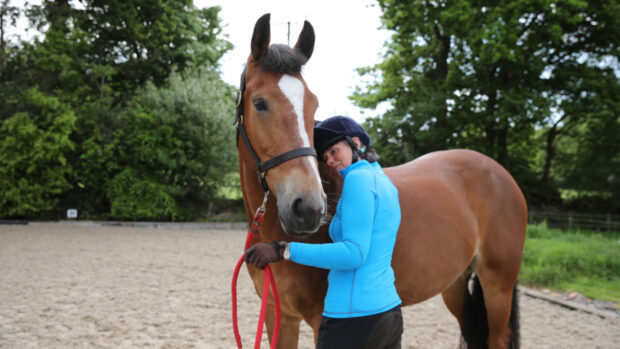IT is down to the whole sport to ensure that there is a “bright future” rather than “dark clouds” on the horizon for jockeys’ mental health.
Experts Duncan Law and Cíara Losty spoke at the Injured Jockeys Fund (IJF) conference at Newbury (26 April) about supporting jockeys’ wellbeing and how the industry and those around them have parts to play.
“We are interested in how we can work with the whole system to prevent problems in the first place,” said Dr Law, a consultant clinical psychologist with experience across elite sport and who has worked in partnership with the IJF since 2019.
“The more we talk about it, and can talk about it together and share our experiences, the more we are able to help ourselves.” He said talking about it is known to be important to helping others as well, adding: “We are helping ourselves and we are helping the people around us and that is a really great thing to do.”
Dr Losty, who works with all licensed jockeys in Ireland as sport psychologist for the Jockey Pathway and also provided on-site support to the Irish eventing team in Tokyo, shared concerning statistics from a 2020 study into Irish jockeys.
The research found nearly 80% of those surveyed met the criteria for at least one mental health disorder, that 61% reported alcohol misuse, 35% depression, 27% anxiety and 19% psychological disorders.
This compares to between 5% and 35% of Olympic athletes reporting mental health difficulties.
Dr Losty said barriers to jockeys reporting problems include negative perceptions, concern over stigma and career implications, plus not recognising symptoms and not knowing where to seek help.
She added that educating jockeys at a younger age and making it a part of the support structure available, as well as support from friends and family, are all part of removing those barriers and improving mental wellbeing.
“The public discourse of mental health around elite athletes has really changed,” said Dr Losty, a lecturer in applied sport and exercise psychology at Waterford Institute of Technology.
“It really is an area that is in its infancy in comparison to other areas in sport,” she said, giving examples of how much more is known about subjects such as physiology and strength by comparison.
The conference heard that media campaigns and openness from other jockeys also encouraged people to seek help.
Dr Law said elite sport is seeking to move away from the “tear and repair” attitude, where someone is sent off to a professional to be “fixed”, then back into the same environment that contributed or exacerbated their issues. He explained the four-pillar strategy for mental wellbeing among jockeys is: promoting positive wellbeing, early identification, understanding jockeys’ needs in context and appropriate and safe response.
“For a large number of jockeys, racing is a coping strategy as well as a stresser,” he said, giving the example of how injury or disciplinary action have a two-sided impact on wellbeing, being both stressful in themselves and taking away how the jockeys cope.
Looking at statistics, the prevalence of current jockeys experiencing anxiety and depression was far greater than those on the licensing courses coming into the sport.
“But it does leave us with some questions,” said Dr Law.
He queried whether perhaps the industry is selecting fewer jockeys with mental wellbeing problems, or perhaps it is self-selecting, and whether the industry is creating mental health problems or supporting people experiencing these to be able to carry on with the sport they “love and enjoy”, while the Olympic system perhaps does not.
“I think we can allow some cautious optimism,” he said. “The new cohort are really open to talking about mental wellbeing issues and open to help-seeking.”
He added that better, earlier support available – and an improved understanding across the industry of mental wellbeing – are also reasons for that optimism.
“Stigma, we think, is reducing, but we are not absolutely sure about this,” he said, adding that as more people speak out about mental wellbeing, that helps reduce stigma and encourages people to accept help.
“But we suspect there are certain pockets where stigma is still high and strong.
“There may be this brighter future and we are optimistic there is, but we have to be cautious. We have to keep mental wellbeing at the forefront of the agenda in racing in the same way as physical health,” he said, adding that these both need to be prioritised together.
“It is down to all of us to make sure that the future is bright.”
You might also be interested in:

Former jockeys more likely to suffer mental health problems than general public *H&H Plus*

Tears for people I’ve never met — why racing’s mental health push gives me hope
H&H’s senior news writer shares her thoughts on the work being done within the racing industry to help those struggling

‘Something Matt would be proud of’: Riders Minds launches new support in Mental Health Awareness Week
During 2021 Mental Health Awareness Week (10-16 May) plans for a new vital resource to help riders get more support

Subscribe to Horse & Hound magazine today – and enjoy unlimited website access all year round

Young riders’ mental health comes into the spotlight
Horse & Hound magazine, out every Thursday, is packed with all the latest news and reports, as well as interviews, specials, nostalgia, vet and training advice. Find how you can enjoy the magazine delivered to your door every week, plus options to upgrade your subscription to access our online service that brings you breaking news and reports as well as other benefits.




